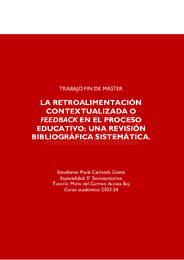Please use this identifier to cite or link to this item:
https://hdl.handle.net/11000/32828Full metadata record
| DC Field | Value | Language |
|---|---|---|
| dc.contributor.advisor | Acosta Boj, María del Carmen | - |
| dc.contributor.author | Carratalá Gomis, Paula | - |
| dc.date.accessioned | 2024-07-30T09:20:39Z | - |
| dc.date.available | 2024-07-30T09:20:39Z | - |
| dc.date.created | 2024-06 | - |
| dc.identifier.uri | https://hdl.handle.net/11000/32828 | - |
| dc.description | Especialidad: Servicios sociosanitarios | es_ES |
| dc.description.abstract | La retroalimentación contextualizada o feedback en el contexto educativo puede ser directa (RCD, indica el error y da la solución) o indirecta (RCI, indica el error, pero no la solución), pudiendo ser proporcionada por distintos agentes como el docente, los pares (varios alumnos) o el propio estudiante. El objetivo de esta revisión fue analizar si el feedback en el ámbito educativo es una técnica de aprendizaje eficaz para los adolescentes, identificando las ventajas/desventajas de la RCD y la RCI y de sus distintos proveedores, además de intentar indagar en su fundamentación científica neurobiológica. Se buscaron artículos publicados entre enero y marzo de 2024, en diferentes bases de datos (ERIC, PsycInfo, PubMed, SCOPUS), empleando palabras clave al respecto y criterios de inclusión y exclusión. Las publicaciones encontradas fueron escasas, un total de 7, realizadas fundamentalmente en países asiáticos y sobre el aprendizaje de lenguas extranjeras. De todos los trabajos analizados se puede concluir que el feedback aumenta la participación activa, el compromiso conductual, emocional y cognitivo del adolescente, aunque disminuye en general su esfuerzo cognitivo. La RCI es más útil para mejorar la precisión gramatical y la RCD para las tareas que requieren mayor esfuerzo. Todos los agentes proveedores son eficaces en el feedback, aunque los estudiantes perciben que es mejor el docente o los pares. No se encontraron artículos sobre la fundamentación neurobiológica de este proceso. Sería necesario realizar más estudios al respecto en nuestro contexto educativo, en otros tipos de aprendizaje y sobre su fundamentación neurobiológica. | es_ES |
| dc.description.abstract | Contextualized feedback in the educational context can be direct (DCF, indicating the error and providing the solution) or indirect (ICF, indicating the error but not the solution). It can be provided by different agents, such as the teacher, peers (several students), or the student him/herself. The aim of this review was to analyze if the feedback in the educational field is an effective learning technique for adolescents, identifying the advantages/disadvantages of DCF and ICF and of their various providers, as well as attempting to explore its neurobiological scientific basis. Articles published between January 2019 and March 2024 were searched in various databases (ERIC, PsycInfo, PubMed, SCOPUS), using relevant keywords and inclusion and exclusion criteria. The publications found were scarce, 7 in total, mainly conducted in Asian countries and focused on foreign language learning. From all the analyzed studies, it can be concluded that feedback increases active participation, and behavioral, emotional, and cognitive engagement of adolescents, although it generally decreases their cognitive effort. ICF is more useful for improving grammatical accuracy, and DCF for tasks that require greater effort. All provider agents are effective in giving feedback, although students perceive that it is better when it is provided by teachers or peers. No articles were found about the neurobiological basis of this process. More studies would be necessary in our educational context, in other types of learning, and on its neurobiological basis. | es_ES |
| dc.format | application/pdf | es_ES |
| dc.format.extent | 23 | es_ES |
| dc.language.iso | spa | es_ES |
| dc.publisher | Universidad Miguel Hernández | es_ES |
| dc.rights | info:eu-repo/semantics/openAccess | es_ES |
| dc.rights.uri | http://creativecommons.org/licenses/by-nc-nd/4.0/ | * |
| dc.subject | Adolescentes | es_ES |
| dc.subject | Aprendizaje | es_ES |
| dc.subject | Retroalimentación contextualizada del docente | es_ES |
| dc.subject | Retroalimentación contextualizada por pares | es_ES |
| dc.subject | Retroalimentación contextualizada directa | es_ES |
| dc.subject | Retroalimentación contextualizada indirecta | es_ES |
| dc.subject.other | CDU::3 - Ciencias sociales::37 - Educación. Enseñanza. Formación. Tiempo libre | es_ES |
| dc.title | La retroalimentación contextualizada o Feedback en el proceso educativo: una revisión bibliográfica sistemática | es_ES |
| dc.type | info:eu-repo/semantics/masterThesis | es_ES |

View/Open:
TFM Carratalá Gomis, Paula.pdf
510,27 kB
Adobe PDF
Share:
.png)
